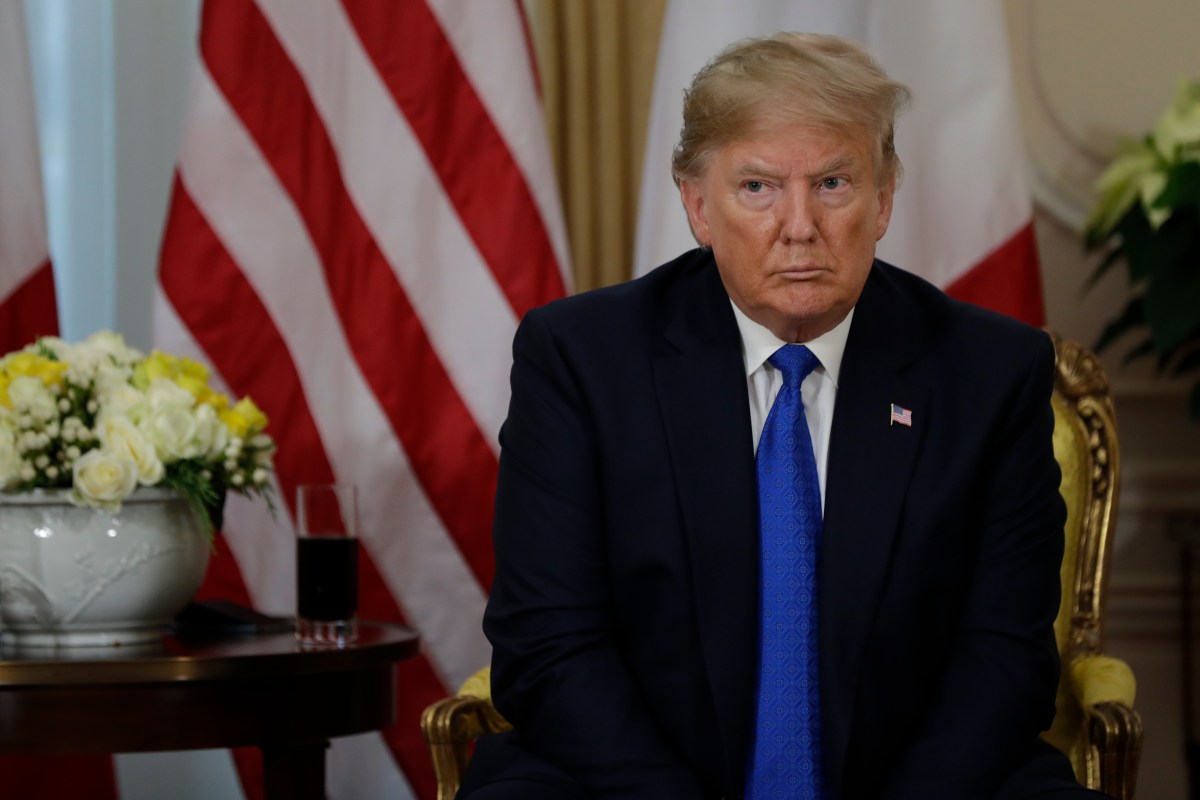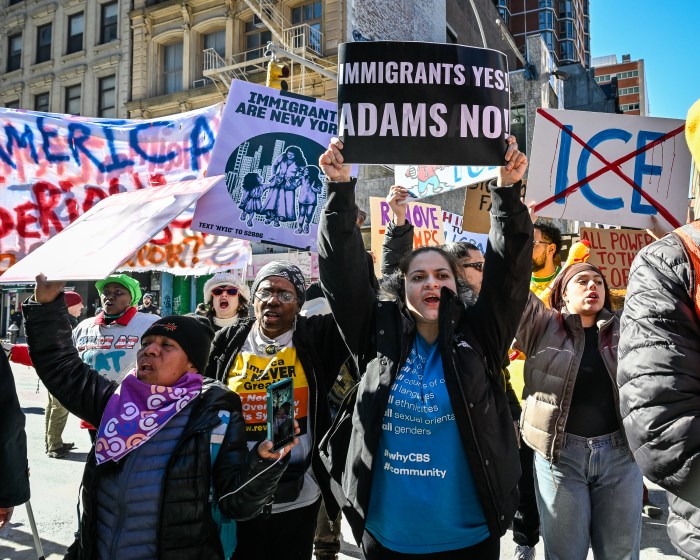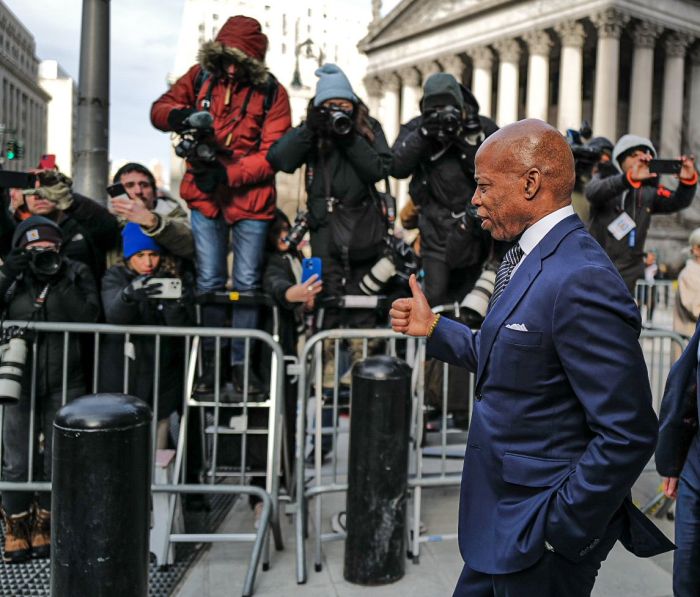When certain associates and acquaintances of President Donald Trump get into hot water, he forgets he ever knew them. Various figures from the Russia investigation and the Ukraine matter as well as a British prince have fallen out of familiarity with the president in this way.
For a few days, the stock market suffered a similar fate when it dipped too low for Trump to boast about it. Buthe rediscovered the market by the end of the week when it rose back up.
A look at some remarks by Trump from the NATO summit in London and from back home as the Democratic effort to impeach him moves ahead:
Prince Andrew
TRUMP: “I don’t know Prince Andrew. … I don’t know him.” — remarks Tuesday with NATO Secretary-General Jens Stoltenberg.
THE FACTS: Trump knows the British prince. Andrew hosted a breakfast for him in June, they toured Westminster Abbey together and photos spread over two decades capture some occasions when they’ve met. The prince stepped back from royal duties after his involvement with sex offender Jeffrey Epstein was exposed.
Trump also recently declared, repeatedly, that he did not know Gordon Sondland, his ambassador to the EU, “very well” and “I have not spoken to him much.” Sondland provided some of the most damning testimony in the House impeachment inquiry about how he had tried to carry out Trump’s wishes to persuade Ukraine to investigate the president’s political rivals in the U.S.
Sondland testified that he’s had many conversations with Trump, who called the ambassador “a really good man and great American” before Sondland’s problematic testimony.
Several people in prominent positions in the Trump campaign or known as close advisers were similarly marginalized — as mere volunteers, hangers-on or low-level functionaries — when it became troublesome during the Russia investigation to acknowledge their stature.
Stock market
TRUMP: “If the stock market goes up or down — I don’t watch the stock market. I watch jobs.” — remarks Tuesday during NATO summit after stocks fell sharply.
THE FACTS: This is not true. Trump watches the stock market, as he demonstrated Friday when the market rebounded and he tweeted precise percentages of how much the S&P, Dow and Nasdaq have gone up this year. “Stock Markets Up Record Numbers,” he tweeted.
Trump uses the stock market as a leading barometer of his presidency, giving the subject a rest only when the market’s performance is down.
It’s an almost constant companion, through thick but not thin.
On a good day, he will tweet about it. Otherwise, his rally speeches and White House remarks are laced with references to the market’s growth since he became president. He takes credit for gains and blames losses on other things, like Democrats.
Trump tweeted about the stock market more than a dozen times in November as it repeatedly edged into record highs.
On one occasion, his boastfulness became too much even for him. He tweeted: “Stock Markets (all three) hit another ALL TIME & HISTORIC HIGH yesterday! You are sooo lucky to have me as your President.” Then he added: “(just kidding!).”
Macron
TRUMP, on French President Emmanuel Macron’s assertion that NATO is suffering “brain death”: “He’s taken back his comments very much so on NATO.” — remarks Wednesday in London.
THE FACTS: No, Macron did not back off what Trump had called a “very, very nasty” statement about NATO. He conspicuously stood by it, before the summit, after it and when face to face with Trump in a tense joint news conference. If anything, Macron appeared to relish the provocation he had brought on.
“I do stand by it,” he said Tuesday as Trump looked on. “I assume full responsibility for it,” he said Wednesday. And Macron tweeted: “The comments I made about NATO prompted a debate among members of the alliance. This dialogue is a very good thing.” He likened himself to an ice-breaker smashing through ice.
Macron characterized NATO as brain dead last month, citing a lack of U.S. leadership and confusion in the alliance about what its fundamental missions should be. He said the U.S. was turning its back on NATO and — in light of Trump’s unexpected announcement in October that he would withdraw troops from Syria — not coordinating with allies on strategic decision-making.
On Wednesday, Macron mildly praised the summit as “constructive” while emphasizing that the fundamentals that sparked his complaint had not been resolved.
Ocean debris
TRUMP: “I also see what’s happening with our oceans, where certain countries are dumping unlimited loads of things in it. They float — they tend to float toward the United States. I see that happening, and nobody has ever seen anything like it, and it’s gotten worse.”‘ — remarks Tuesday with Canadian Prime Minister Justin Trudeau.
THE FACTS: He’s right that garbage from abroad has come to U.S. shores by sea. What he does not say, when making this repeated complaint, is that garbage from the U.S. also makes it over the ocean to other countries and that Americans have plenty to do with trashing their own shores.
Debris from Asia was most noticeable after the 2011 Japanese tsunami, said marine debris expert Kara Lavender Law of the Sea Education Association, “but the same can be said about debris entering the ocean from the U.S. and washing ashore in Asia.” In fact, she said, most debris is not tracked to the country of origin.
The United States produces the largest amount of plastic waste in the world by weight, Law said.
“Most debris we find on the coast of the US is likely from the US,” Denise Hardesty, a scientist who researches ocean trash for Australia’s federal science organization, said by email.
Hardesty surveyed the U.S. West Coast from Washington to the California border with Mexico and found the dirtiest place was in Long Beach at the river mouth, where researchers found 4,500 items.
Marcus Eriksen, chief science officer and co-founder of the 5 Gyres Institute, which fights plastics pollution, said Asian fishing gear arrives as debris in Alaska and British Columbia because of north Pacific currents, a problem exacerbated by the lack of regulation of such gear. But in pointing the finger at Asia, Trump is ignoring “our own problems with plastic waste here at home.”
Impeachment
TRUMP: “The word ‘impeachment’ is a dirty word, and it’s a word that was only supposed to be used in special occasions: high crimes and misdemeanors. In this case, there was no crime whatsoever. Not even a little tiny crime. There was no crime whatsoever, and they know it. ” — remarks Wednesday with Italian Prime Minister Giuseppe Conte.
THE FACTS: That’s a misrepresentation of the conditions for impeaching a president. The constitutional grounds for impeachment do not require any crime to have been committed. In setting the conditions, treason, bribery or high crimes and misdemeanors, the Founding Fathers said that a consequential abuse of office — crime or not — was subject to the impeachment process they laid out.
Months after the 1787 Constitutional Convention, Alexander Hamilton explained in the Federalist Papersthat a commonly understood crime need not be the basis of impeachment. Offenses qualifying for that step “are of a nature … POLITICAL, as they relate chiefly to injuries done immediately to the society itself,” he wrote.
As they move toward drafting articles of impeachment, though, Democrats are alleging crimes involving obstruction of justice as part of their case that Trump abused his office.
Zelenskiy
TRUMP, on his July 25 call with Ukraine’s president, Volodymyr Zelenskiy: “All you have to do is listen to the call or read the call. We had it transcribed perfectly. But he was — he said — no pressure, no nothing. There was no nothing.” — remarks Wednesday with Conte.
TRUMP: “Breaking News: The President of Ukraine has just again announced that President Trump has done nothing wrong with respect to Ukraine and our interactions or calls … case over!” — tweet Monday.
THE FACTS: Trump misleads in suggesting that Zelenskiy didn’t have any concerns about the call. Nor was the call “transcribed perfectly;” only a rough transcript was released by the White House.
While Zelenskiy initially said there was no discussion of a quid pro quo, he said in an interview Monday with Time that Trump should not have blocked military aid to Ukraine. Zelenskiy also criticized Trump for casting the country as corrupt, saying it sends a concerning message to international allies.
On that call discussing military aid, Trump asked Zelenskiy to investigate Trump’s political rivals in the U.S.
“Look I never talked to the president from the position of a quid pro quo,” Zelenskiy said. “But you have to understand. We’re at war. If you’re our strategic partner, then you can’t go blocking anything for us. I think that’s just about fairness.”
On corruption, Zelenskiy said it unfairly undermines support for the country.
“Everyone hears that signal,” he said. “Investments, banks, stakeholders, companies, American, European, companies that have international capital in Ukraine, it’s a signal to them that says, ‘Be careful, don’t invest.’ Or, ‘Get out of there.’”
It’s true that in early October, Zelenskiy had told reporters “there was no pressure or blackmail from the U.S.” But he did not state Trump had done “nothing” wrong, even as he let his criticisms simmer before surfacing them.
In any event, Zelenskiy knew months before the call that much-needed U.S. military support might depend on whether he was willing to help Trump by investigating Democrats.
Right to an attorney
TRUMP: “For the hearings, we don’t get a lawyer.” — remarks Tuesday with Canadian Prime Minister Justin Trudeau.
THE FACTS: Trump is wrong about being deprived of an attorney in the House Judiciary Committee hearings. The committee invited Trump and his lawyers to appear if he wishes, but the White House refused.
In a letter early in the week to Judiciary Committee Chairman Jerrold Nadler, D-N.Y., White House counsel Pat Cipollone declined the invitation for the president’s counsel to appear at Wednesday’s hearing while Trump was at the NATO summit, insisting that the inquiry violates “basic due process rights.”
For hearings in the coming week, Trump had until Friday to decide whether he would take advantage of due process protections afforded to him under House rules adopted in October. He was offered an opportunity to ask for witness testimony and to cross-examine the witnesses called by the House. But he decided not to participate in that round, too.
If the House impeaches Trump, the Senate trial will look like a normal trial in some respects, with senators as the jury. Arguments would be heard from each side’s legal team for and against Trump’s removal from office.
The Intelligence Committee hearings, in contrast, were like the investigative phase of criminal cases, conducted without the participation of the person under investigation.
— Hope Yen and Calvin Woodward
Associated Press writers Eric Tucker, Seth Borenstein, Darlene Superville and Paul Wiseman in Washington, Jill Lawless in London and Sylvie Corbet in Paris contributed to this report.






































